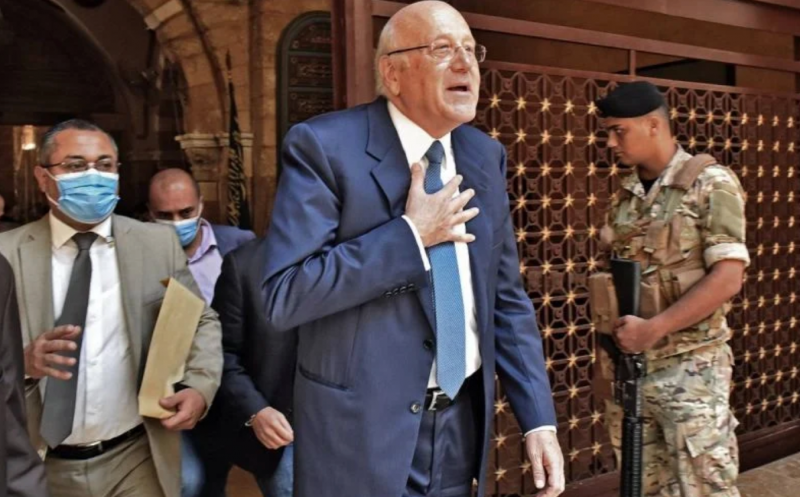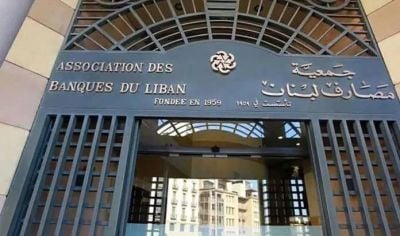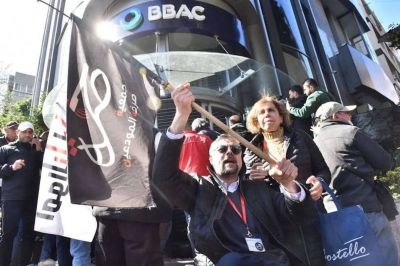
Outgoing Prime Minister Najib Mikati in front of the al-Omari mosque in Beirut, September 10, 2021. (Credit: AFP)
Lebanon took a bit of a breather as the banks reopened their doors amid their strike and salaries were paid. The worst, according to some, was avoided. Yet the caretaker prime minister’s decision to intervene has awakened old demons.
The matter dates back to about two weeks ago. On Feb. 22, Najib Mikati tasked caretaker Interior Minister Bassam Mawlawi with taking the “appropriate measures” in relation to prosecutor Judge Ghada Aoun’s case against some commercial banks.
This intervention in Judge Aoun’s proceedings consisted of ordering the security forces to not enforce the judge’s decisions. Despite the over 40 requests filed against her, calling for her dismissal and banning her from handling financial crimes, Judge Aoun carried on her investigations in order to highlight the abuses of the system.
Accused by her critics of exceeding her powers, Aoun has stated that she is at war against a culture of impunity. The institutions most recently targeted by the judges' proceedings — SGBL, Bank Audi and Bank of Beirut — refused to hand over the documents requested as part of the investigations.
But the tug-of-war between the banks and the judge, who is affiliated with the Free Patriotic Movement, was suddenly settled in late February, when the caretaker prime minister decided to intervene — much to everyone’s surprise.
The Grand Serail justified its decision to intervene in the judiciary by saying its move was in the “national interest.”
“Our objective is to protect the banking sector,” and not “a person or groups,” Mikati said at the time. True to his argument that the economy’s revival relies on the private sector and the banks, Mikati and others in business circles insist on the need to prevent the collective wreckage that could result from the open-ended strike that the Association of Banks in Lebanon (ABL) began in early February after the Court of Cassation ruled in favor of depositors.
“The country’s stability was threatened: the decision was taken so that the justice system concerned would assume its responsibilities, and not in order to act in its stead,” said Fares Gemayel, spokesperson for Mikati.
Raising the specter of a worst-case scenario in order to justify exceptional measures: a formula that has been tried and tested elsewhere. This is validated by some observers who see the executive branch’s intervention as a necessary defense against the banks’ failure.
“Had the situation degenerated, the country would have been completely blocked,” said Sami Nader, economist and director of the Levant Institute for Strategic Affairs.
Panic
Yet, in the hope of rescuing the economy, it is the justice system that is plunging. According to judicial circles, the executive branch crossed the maximum safe limit. Never in the history of Lebanon has a prime minister so blatantly violated the most basic laws related to the separation of powers.
“This is an unprecedented phenomenon, just as the implosion of the judiciary in the country is an unprecedented phenomenon,” said Chucri Sader, former president of the State Shura Council. “If it was really about the country’s national interest, one should have warned, addressed the justice minister or the judicial authorities and should not have interfered in the daily work of another power,” he added.
But it goes beyond the issue of the balance of power. By rushing to rescue the banking institutions, Mikati has revived old suspicions. He is the prime minister, but also a businessman close to financial circles. Mikati, who was known for defending Banque Du Liban’s governor in the midst of the economic meltdown, seems to be increasingly disconnected from Lebanon’s reality. While more than a year ago, voices across the country called for the dismissal of Riad Salameh, Mikati insisted that “one does not change their officers during a war.”
Leading a cabinet that has since late October been considered resigned, Mikati had kept a low profile over the past months, limiting himself to the management of the most pressing matters.But these new developments in the banking dossier have shaken up this relative caution.
“He betrayed a certain panic,” said Karim Bitar, director of the Institute of Political Science at Saint Joseph University.
It was already known that he has “historical links” with some large financial groups, including Saradar Bank, where he is a shareholder and Bank Audi. “His relations with Samir Hanna, current director general of the latter institution, are very old,” a banker close to the issue said on condition of anonymity.
“It is Audi that supported him in his business when he started,” he added. The bank refused to answer L’Orient’s questions upon being contacted..
In a country where many politicians are bank shareholders, Mikati’s case is far from atypical. What distinguishes him, however, is that he was mentioned several times in large-scale financial scandals that have yet to be decided on.
The first scandal broke in 2019, a few days after the uprising, when Ghada Aoun initiated proceedings against Mikati, his brother Taha and his son Maher for illicit gains from real estate loans subsidized by the central bank. Judge Charbel Abou Samra dropped the charges in February 2022 due to prescription. The European investigations initiated against Salameh from 2020 revealed that Mikati transferred $14 million dollars in 2016 to Forry Associates, a company registered in Switzerland in the name of Raja Salameh, the younger brother of the BDL governor. Was this transfer a gift in return for past favors? This remains unclear.
What is certain, however, is that evidence is accumulating as the investigations progress. While “there is a lot that we don’t know about his relationship with the banks,” said a former senior judge, “there is now a legitimate suspicion that Mikati is protecting BDL governor, and the banking sector in general.”
Pawn
But the “man of the system” does not act alone. Beyond individual interests lies an entire system. “Najib Mikati is only a pawn,” said the above-mentioned banker.
“Some people in power have agreed to prevent a general bankruptcy in the sector, refusing that the complaints filed [by associations of depositors] lead to a general bankruptcy, which could happen if we stick to the law,” said Mounir Younes, journalist and economic expert.
This phenomenon started in the early days of the new Lebanese republic. A Mikati style defense of Lebanon’s Banking sector has been a long-standing policy of Lebanon’s ruling elite.
“It goes back as far as the country’s formal independence in 1943,” said academic Hicham Safieddine.. But if “bankocracy” was born with the Lebanese state, it was not until the 1990s that it became as prominent as it currently is, with “financial logic” definitively overtaking collective interest. “After the Civil War [1975-1990], this relationship was strengthened under Rafik Hariri, when the government became increasingly reliant on public debt, financed by the banks, for its functioning,”posits Saffiedine.
But while the justice system has long turned a blind eye to the strong link between politics and banks, Mikati’s actions remind us of this political-financial marriage that rests protected by emissaries in the heart of the judicial machine. Generally oriented towards financial deregulation, the legal system is at first glance, favorable to a liberal way of thinking while simultaneously governing the market. But it is in times of crisis that the real allegiances become obvious.
“The judiciary in Lebanon is ultimately subordinate to the sectarian powers of the status quo,” said Safieddine.
While a handful of atypical judges have sided with citizens by forcing banks to return part of the deposits, the majority has worked to slow down or even block the proceedings. “Some even knowingly refused to apply the law,” said Sader. “A judiciary that is “asleep” in the face of laws that are “simple and straightforward.”
This article was originally published in French in L'Orient-Le Jour. Translation by Joelle El Khoury.

